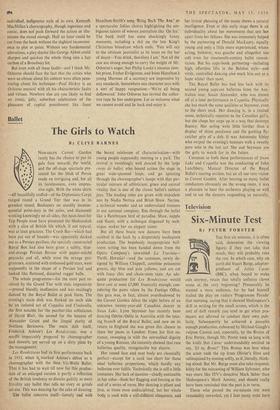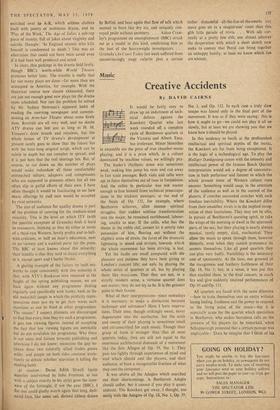Television
Six-Minute Test
By PETER-FORSTER THE first six minutes, it is often said, determine the viewing figure; if they can take that much, they will probably take the rest. In which case, why on earth did Stuart Burge, adaptor- producer of Julius Cesar (BBC), when bound to make cuts anyway, retain that totally unfunny clown scene at the very beginning? Presumably he wanted a mass audience, for he had himself trailed the play on radio's 'Programme Parade' that morning, saying that it showed Shakespeare's skill in writing for the small screen, which is the sort of daft remark you tend to get when pro- ducers are allowed to conduct their own pub- licity. Subsequently he achieved a passable enough production, enhanced by Michael Gough's vulpine Cassius and, especially, by the Brutus of Eric Porter, though Mr. Porter took so long with the knife that Cesar understandably omitted to say, 'Et tu, Brute?' This Brutus was best when the actor took the tip from Olivier's films and soliloquised by musing softly, as if, literally, think- ing aloud. But Mr. Burge must also take responsi- bility for the miscasting of William Sylvester, who was more like ITV's detective Mark Saber than. Shakespeare's Mark Antony, and should really have been reminded that the part is in verse.
Those who passed the six-minute test were reasonably rewarded, yet I fear many must have switched over to A-R, which seldom clutters itself with poetry or ambitious drama, and its `Play of the Week,' The Age of Juliet, a sub-rep piece of inanity, full of jokes about virginity and suicide. (Sample: 'In England anyone who kills himself is condemned to death.') This was an aberration that could not have been saved even if it had been well produced and acted.
In short, thin pickings in the drama field lately, though BBC's worth-while World Theatre promises better later. The trouble is really that far too many plays are done—far more than are attempted in America, for example. With the theatrical source now almost exhausted, there are just not enough good new plays for the drama spots scheduled. Nor can the problem be solved by Mr. Sydney Newman's apparent habit of reading the morning newspaper and commis- sioning an Armchair Theatre about some lively item. Revivals are all very well, and no doubt ATV drama can last just as long as H. M. Tennent's draw breath and royalties, but the whole lesson of TV drama's development at present surely goes to show that the future lies with the hour-long original script, which can be subtle in depth but not complex in spread; and it is just here that the real shortage lies. But, of course, to cut down on the number of plays would make redundant all those comfortably entrenched editors, adaptors and compressors who are supposed to promote others but all too often slip in pallid efforts of their own. I have often thought it would be fascinating to see how many offerings by staff men would be accepted by rival networks.
The size of audience for quality drama is part of the problem of catering for the medium-sized minority. This is the level on which 1TV (with the possible exception of Granada) finds it hard to manoeuvre, thinking as they do either in terms of a third-rate Western, lovely profits and to-hell- with-criticism, or half an hour's education, next to no viewers and a cocktail party for the press. The BBC at least knows about this minority; their trouble is that they tend to direct everything at it, except sport and Charlie Drake.
A glaring example of the failure by both net- works to cope consistently with this minority is that, with ATV's Bookman now removed at the height of the spring publishing season, we are back again without any programme dealing regularly and specifically with books, back to the old makeshift jungle in which the publicity repre- sentatives must just try to get their wares such mentions as can be fixed in other programmes. The reason? I suspect planners are discouraged to find that every time they try such a programme, it gets low viewing figures, instead of accepting the fact that low viewing figures are inevitable but do not invalidate the programme. Why there is not some real liaison between publishing and television I do not know; meantime the gap be- tween these two naturally allied trades grows wider, and people on both sides continue irrele- vantly to debate whether television is killing the reading habit.
At random : Dame Edith Sitwell (quite superbly interviewed by John Freeman, at last with a subject exactly to his style) gave the inter- view of the fortnight, if not the year (BBC). I for one could gladly watch again that long. dedi- cated face, like some sad, shrewd abbess drawn by Bellini, and hear again that flow of talk which seemed to burn like dry ice, and uniquely con- veyed pride without snobbery. . . . Aidan Craw- ley's programme on unemployment (BBC) struck me as a model in this kind, confirming him as the best of the heavyweight investigators. . . . Granada's In Court Today last week suffered from unconvincingly stagy culprits plus a certain rather distasteful all-the-fun-of-the-courts air; more goes on in a magistrates' court than this glib little parade of trivia. . . . With ads cur- rently at a pretty low ebb, one almost admires the desperation with which a short sketch now seeks to convey that Persil can bring together an unhappy family; at least we know which lies are whitest.



































 Previous page
Previous page